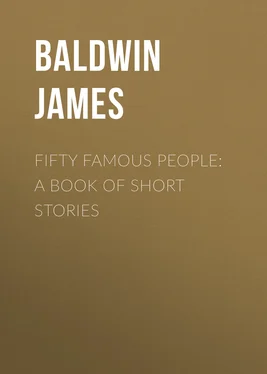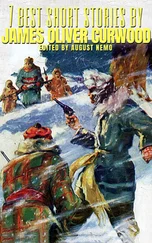James Baldwin - Fifty Famous People - A Book of Short Stories
Здесь есть возможность читать онлайн «James Baldwin - Fifty Famous People - A Book of Short Stories» — ознакомительный отрывок электронной книги совершенно бесплатно, а после прочтения отрывка купить полную версию. В некоторых случаях можно слушать аудио, скачать через торрент в формате fb2 и присутствует краткое содержание. Жанр: foreign_children, foreign_antique, foreign_prose, на английском языке. Описание произведения, (предисловие) а так же отзывы посетителей доступны на портале библиотеки ЛибКат.
- Название:Fifty Famous People: A Book of Short Stories
- Автор:
- Жанр:
- Год:неизвестен
- ISBN:нет данных
- Рейтинг книги:5 / 5. Голосов: 1
-
Избранное:Добавить в избранное
- Отзывы:
-
Ваша оценка:
- 100
- 1
- 2
- 3
- 4
- 5
Fifty Famous People: A Book of Short Stories: краткое содержание, описание и аннотация
Предлагаем к чтению аннотацию, описание, краткое содержание или предисловие (зависит от того, что написал сам автор книги «Fifty Famous People: A Book of Short Stories»). Если вы не нашли необходимую информацию о книге — напишите в комментариях, мы постараемся отыскать её.
Fifty Famous People: A Book of Short Stories — читать онлайн ознакомительный отрывок
Ниже представлен текст книги, разбитый по страницам. Система сохранения места последней прочитанной страницы, позволяет с удобством читать онлайн бесплатно книгу «Fifty Famous People: A Book of Short Stories», без необходимости каждый раз заново искать на чём Вы остановились. Поставьте закладку, и сможете в любой момент перейти на страницу, на которой закончили чтение.
Интервал:
Закладка:
I'll tell a tale how Farmer John
A little roan colt bred, sir,
Which every night and every morn
He watered and he fed, sir.
Said Neighbor Joe to Farmer John,
"You surely are a dolt, sir,
To spend such time and care upon
A little useless colt, sir."
Said Farmer John to Neighbor Joe,
"I bring my little roan up
Not for the good he now can do,
But will do when he's grown up."
The moral you can plainly see,
To keep the tale from spoiling,
The little colt you think is me—
I know it by your smiling.
And now, my friends, please to excuse
My lisping and my stammers;
I, for this once, have done my best,
And so—I'll make my manners.
The little boy's name was Edward Everett. He grew up to become a famous man and one of our greatest orators.
WRITING A COMPOSITION
"Children, to-morrow I shall expect all of you to write compositions," said the teacher of Love Lane School. "Then, on Friday those who have done the best may stand up and read their compositions to the school."
Some of the children were pleased, and some were not.
"What shall we write about?" they asked.
"You may choose any subject that you like best," said the teacher.
Some of them thought that "Home" was a good subject. Others liked "School." One little boy chose "The Horse." A little girl said she would write about "Summer."
The next day, every pupil except one had written a composition.
"Henry Longfellow," said the teacher, "why have you not written?"
"Because I don't know how," answered Henry. He was only a child.
"Well," said the teacher, "you can write words, can you not?"
"Yes, sir," said the boy.
"After you have written three or four words, you can put them together, can you not?"
"Yes, sir; I think so."
"Well, then," said the teacher, "you may take your slate and go out behind the schoolhouse for half an hour. Think of something to write about, and write the word on your slate. Then try to tell what it is, what it is like, what it is good for, and what is done with it. That is the way to write a composition."
Henry took his slate and went out. Just behind the schoolhouse was Mr.
Finney's barn. Quite close to the barn was a garden. And in the garden, Henry saw a turnip.
"Well, I know what that is," he said to himself; and he wrote the word turnip on his slate. Then he tried to tell what it was like, what it was good for, and what was done with it.
Before the half hour was ended he had written a very neat composition on his slate. He then went into the house, and waited while the teacher read it.
The teacher was surprised and pleased. He said, "Henry Longfellow, you have done very well. Today you may stand up before the school and read what you have written about the turnip."
Many years after that, some funny little verses about Mr. Finney's turnip were printed in a newspaper. Some people said that they were what Henry Longfellow wrote on his slate that day at school.
But this was not true. Henry's composition was not in verse. As soon as it was read to the school, he rubbed it off the slate, and it was forgotten. Perhaps you would like to read those funny verses. Here they are; but you must never, never , NEVER think that Henry Longfellow wrote them.
Mr. Finney had a turnip,
And it grew, and it grew;
It grew behind the barn,
And the turnip did no harm.
And it grew, and it grew,
Till it could grow no taller;
Then Mr. Finney took it up,
And put it in the cellar.
There it lay, there it lay,
Till it began to rot;
Then Susie Finney washed it
And put it in a pot.
She boiled it, and boiled it,
As long as she was able;
Then Mrs. Finney took it,
And put it on the table.
Mr. Finney and his wife
Both sat down to sup;
And they ate, and they ate,
They ate the turnip up.
All the school children in our country have heard of Henry W. Longfellow. He was the best loved of all our poets. He wrote "The Village Blacksmith," "The Children's Hour," and many other beautiful pieces which you will like to read and remember.
THE WHISTLE
Two hundred years ago there lived in Boston a little boy whose name was Benjamin Franklin.
On the day that he was seven years old, his mother gave him a few pennies.
He looked at the bright, yellow pieces and said, "What shall I do with these coppers, mother?"
It was the first money that he had ever had.
"You may buy something, if you wish," said his mother.
"And then will you give me more?" he asked.
His mother shook her head and said: "No, Benjamin. I cannot give you any more. So you must be careful not to spend these foolishly."
The little fellow ran into the street. He heard the pennies jingle in his pocket. How rich he was!
Boston is now a great city, but at that time it was only a little town.
There were not many stores.
As Benjamin ran down the street, he wondered what he should buy. Should he buy candy? He hardly knew how it tasted. Should he buy a pretty toy? If he had been the only child in the family, things might have been different. But there were fourteen boys and girls older than he, and two little sisters who were younger.
What a big family it was! And the father was a poor man. No wonder the lad had never owned a toy.
He had not gone far when he met a larger boy, who was blowing a whistle.
"I wish I had that whistle," he said.
The big boy looked at him and blew it again. Oh, what a pretty sound it made!
"I have some pennies," said Benjamin. He held them in his hand, and showed them to the boy. "You may have them, if you will give me the whistle." "All of them?"
"Yes, all of them."
"Well, it's a bargain," said the boy; and he gave the whistle to Benjamin, and took the pennies.
Little Benjamin Franklin was very happy; for he was only seven years old. He ran home as fast as he could, blowing the whistle as he ran.
"See, mother," he said, "I have bought a whistle."
"How much did you pay for it?"
"All the pennies you gave me."
"Oh, Benjamin!"
One of his brothers asked to see the whistle.
"Well, well!" he said. "You've paid a dear price for this thing. It's only a penny whistle, and a poor one at that."
"You might have bought half a dozen such whistles with the money I gave you," said his mother.
The little boy saw what a mistake he had made. The whistle did not please him any more. He threw it upon the floor and began to cry.
"Never mind, my child," said his mother, very kindly. "You are only a very little boy, and you will learn a great deal as you grow bigger. The lesson you have learned to-day is never to pay too dear for a whistle." Benjamin Franklin lived to be a very old man, but he never forgot that lesson.
Every boy and girl should remember the name of Benjamin Franklin. He was a great thinker and a great doer, and with Washington he helped to make our country free. His life was such that no man could ever say, "Ben Franklin has wronged me."
THE ETTRICK SHEPHERD
I
In Scotland there once lived a poor shepherd whose name was James Hogg. His father and grandfather and great-grandfather had all been shepherds.
It was his business to take care of the sheep which belonged to a rich landholder by the Ettrick Water. Sometimes he had several hundreds of lambs to look after. He drove these to the pastures on the hills and watched them day after day while they fed on the short green grass.
Читать дальшеИнтервал:
Закладка:
Похожие книги на «Fifty Famous People: A Book of Short Stories»
Представляем Вашему вниманию похожие книги на «Fifty Famous People: A Book of Short Stories» списком для выбора. Мы отобрали схожую по названию и смыслу литературу в надежде предоставить читателям больше вариантов отыскать новые, интересные, ещё непрочитанные произведения.
Обсуждение, отзывы о книге «Fifty Famous People: A Book of Short Stories» и просто собственные мнения читателей. Оставьте ваши комментарии, напишите, что Вы думаете о произведении, его смысле или главных героях. Укажите что конкретно понравилось, а что нет, и почему Вы так считаете.












